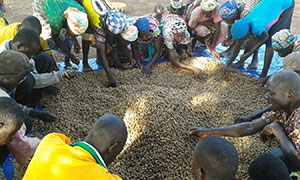SPRING Shares SBC Approaches for Nutrition-Sensitive Agriculture in Guinea at ICTforAg2017
At the ICTforAg 2017 conference, SPRING presented aspects of its social behavior change communication programming in Guinea.
At the ICTforAg 2017 conference, SPRING presented aspects of its social behavior change communication programming in Guinea.
From July 7-11, 2017, over 1,500 health economists and public health practitioners gathered in Boston to discuss new ideas for the economics of global health systems. Topics discussed included latest methods and debates on cost effectiveness analysis, healthcare financing, economic evaluation, and implications for health policy.

Groundnuts are a major legume crop in the northern regions of Ghana and provide important nutrients for physical development. When handled improperly, however, groundnuts can be toxic to humans.
Poverty is often a precursor to malnutrition. When families don’t have access to diverse diets and proper sanitation, the youngest members in the critical first 1,000 days, from pregnancy up to the child’s second birthday, suffer lifelong consequences that only further the cycle of poverty. Working with existing poverty alleviation programs is a natural entry point for nutrition programs seeking to reach the most vulnerable households.
Fanta visits her sister, Awa, who teaches her how to cook. She notices that her neighbor has a variety of preserved fruits and vegetables. Awa explained how she made the preserves when she had an abundance of vegetables. Amazed by what she’s seen, Fanta asks her sister to teach her these drying methods. Awa takes her to the village facilitator who teaches her to dry and conserve fruits and vegetables. Storing produce during the rainy season can help families access nutritious foods during the dry season when fruit and vegetables are typically expensive and hard to find.
Thiane Dramé is a champion of agricultural diversification in Senegal’s Kaolack Region. By practicing improved poultry raising, planting bio-fortified millet crops, and cultivating a micro-garden with a wide variety of vegetables, Thiane improves the nutrition of her family and increases her financial income. Furthermore, she shares what she has learned with her community.
Cheickh Mbaké is a happy maize farmer from Senegal. He goes with his cousin, Momath, to the farmer co-op to pick up the money he’s earned from selling his maize. Thanks to quality assurance through the co-op, he was able to sell his corn at a better price. Momath, who is not a member of a co-op, realizes that even though he produced more maize than Cheikh, he didn’t earn as much. Not wanting to continue living at a disadvantage, he asks his cousin to help him understand quality assurance for his crops.
Ya Ngoné is a fish vendor and lactating mother who lives and works in Djilor, a village not far from the sea in Senegal. She is very careful about hand hygiene and is supported in these good pratices by her mother, Daba. Daba is always encouraging women to build tippy-taps (a simple hand-washing system) by their homes and to always wash their hands at the five critical moments: before eating, before feeding the baby, before preparing food, after using the toilet, and after cleaning the baby.
El Hadj, a father in Senegal who cares about the health of his family, is very attached to his home. Knowing the importance of good hygiene in preventing illness like diarrhea, malaria, and malnutrition, he supports his wife, Aby, with her tasks. Together, they collect and remove garbage from the yard, eliminate standing water, clean the latrines, and ensure all family members wash their hands with clean water and soap.
During a four-day training, SPRING/Guinea worked with Peace Corps health and agroforestry volunteers to strengthen their maternal, infant, and young child nutrition (MIYCN) and nutrition-sensitive agriculture knowledge. The photos illustrate how participants explored the importance of the first 1000 days, breaking the cycle of malnutrition, the connection between agriculture and nutrition, and their roles as agents of change in their communities.